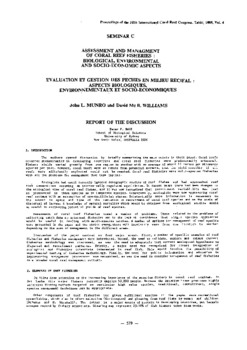Assessment and management of coral reef fisheries: biological, environmental and socio-economic aspects

Citation
Munro, J.L.; Williams, D.M.B. (1985). Assessment and management of coral reef fisheries: biological, environmental and socio-economic aspects. p. 545-581. In: Proceedings of the Fifth International Coral Reef Congress, Tahiti, vol. 4
The authors opened discussion by briefly summarising the main points in their paper. Coral reefs occurred predominantly in developing countries and coral reef fisheries were predominantly artesanal. Fishery yields varied greatly from one region to another with an average of about 15 tonnes per kilometre squared per year. However, coral reefs were so remote from potential markets, that the yield possible if all reefs were efficiently exploited would rot be reached. Coral reef fisheries were multi-species fisheries with all the problems for management that term implies. Ecologists had until recently ignored demographic studies of reef fishes and had approached reef fish communities assuming an intrinsically regulated equilibrium. In recent years there had been changes to the ecological view of coral reef fishes, and it was now recognised that recruitment variablility was just as pronounced in these species as in temperate species. Consequently, ecologists were now approaching coral reef systems with an assumption of non-equilibrial states.
Permalink
Date Available
Type
Publisher
Research Themes
Language